#Discourse Analysis
Text
A Linguistic Analysis: Manga Translation (EN/JP/TWN) Comparison of Chapter 90.1 | Part 3
This is written in response to @connoisseursdecomfort's post Comparing Versions of Short Mission 11
((I realized that I should have just made this into a post because my response would be lost as a reblog. And it did... OTL
Also, this is an updated version with more insight/details))

Consider this is as a part 3 of my Linguistic Analysis posts on Spy x Family's Ch. 90.1 or Short Mission 11.
Part 1: A Linguistic Analysis of the Spelling "Ania" and "Anya"...
Part 2: "Ania" is the closest to an identity reveal
This analysis contains spoilers from Chapter 90.1 / Short Mission 11!
What's so interesting about the discourse analysis amongst Japanese, Taiwanese, and English translations is the hedging (word choices that lessen the directness of a dialogue) langauge that Loid uses. It is more clear in the Japanese ("by the way") and Taiwanese ("it came to mind") translations. Whereas, English's hedging is found in "...right?" What the three of them do share in common is that Loid's discourse is pointing to active voice by stating "your name is spelled A-N-Y-A". Apply all of these translations below:
(ENG) Your name is spelled A-N-Y-A, right?
(JP) By the way, your name is spelled A-N-Y-A.
(TW) It came to mind, your name is spelled A-N-Y-A.
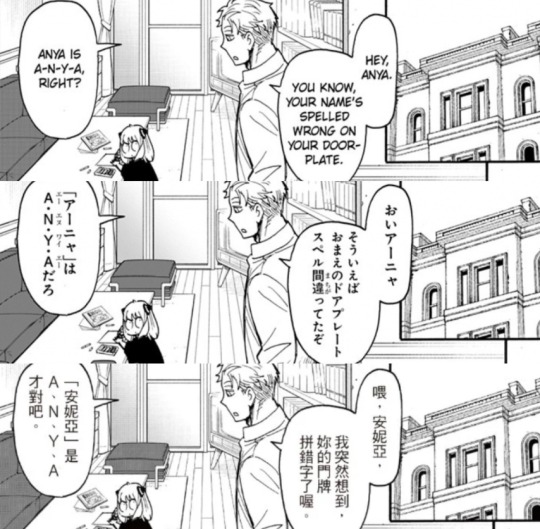
It is consistent that Loid's tone is holding authority by demonstrating his knowledge on Ostanian orthography based off the transcriptions he's seen of Anya's name registered as "A-N-Y-A" which was spelled by her previous Ostanian adopted parents. So Twilight feels confident that the spelling of her name MUST be "Anya."
Another thing I wanted to add on to @connoisseursdecomfort's observation is catching loss of translation, which is so unfortunately common. English translation omits translations mainly because some expressions or dialogue that are common in a language (Japanese and Taiwanese) would be perceive differently in English-speaking countries (USA, UK, AUS, CAN, etc.). This is called cultural discount.
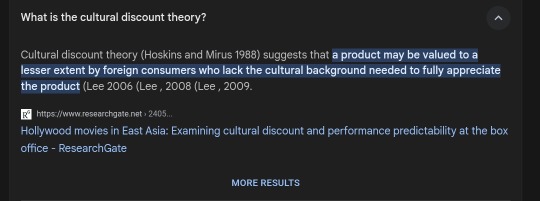

It's the reason why Squid Game English dub missed out on many jokes that are play on words in the Korean dub. It is also the reason why a lot of American jokes are not understood by non-English speakers OTL
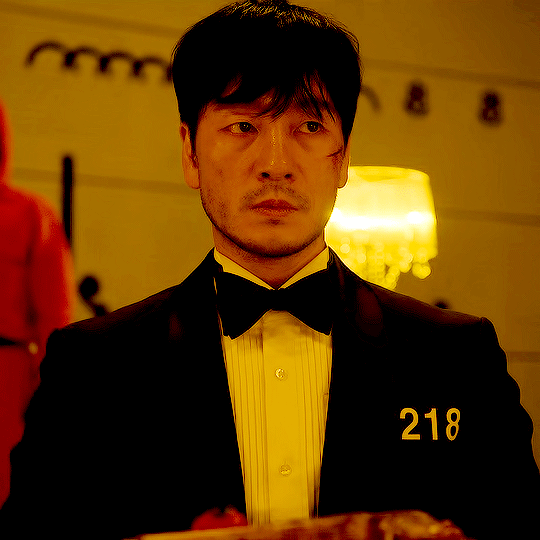
But this is a general phenomenon because English native consumers would find the expression strange simply because we do not have this style reflected in our discourse. The best example is when @_mika60 translated the omitted text "Anya's heart stirred at the mention of her own name."
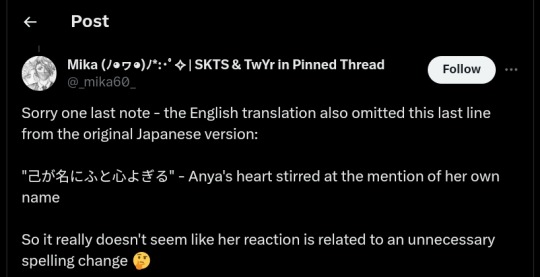
To an American (possibly English natives in general, but I can't really speak on behalf of British, Canadians, nor Australians beause their English may be slightly different in terms of cultural lifestyle/upbringing), this expression can be perceived as corny/purple-prosey. Because American discourse don't generally have this emotionally-charged reflective discourse. Hence, omitted. Which is unfortunate because it says so much about how Loid's spelling affected Anya's feelings. So this is a perfect example of cultural discount.
An example of loss in translation is the omission of Anya's text which explains why she can't carve out her name is due to feeling insecure about her bad handwriting. (Again, this is character analysis that English-reading consumers missed out on! Because anything written in the manga is deemed canon.) Whereas English, we completely omit that detail because English native speakers don't need that extra dialogue. The English discourse is typically straight to the point and English native consumers draw inferences from icons (images/illustrations).
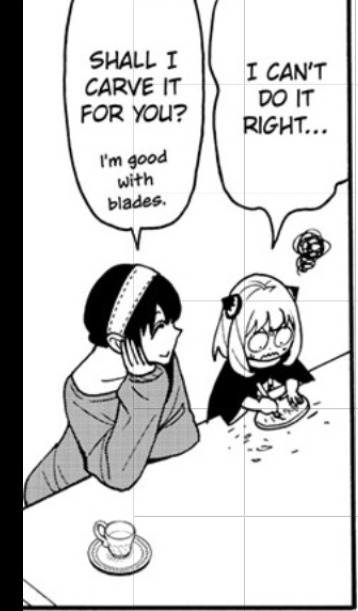
Based off my explanation, this is how I see the above picture as an American consumer (using a think-aloud method):
Anya says, "I can't do it right..." and she looks frustrated as illustrated by the swirl above her head.
Her brows are furrowed which supports that she's annoyed/frustrated/angry.
Her cheeks... are they blushes? Is she embarrassed? I can't really tell.
She's also a 4 y/o or was it 5 y/o child (she lied being 6, right?) so it's obvious she probably might be annoyed because she can't draw straight lines.
Because she's an infant, I'm sure she doesn't have the strength to draw clean lines.
Based off my thought process above, do I think OR am I convinced that Anya feels insecure? No.
Can it be argued that she's insecure? Yes, absolutely.
If I were to talk to someone who posits Anya may be insecure because of his/her knowledge of children behavior and/or mannerism, then I would be convinced. However, I would arrive to this assimilation through negotiating observations and exchanging knowledge of children behavioral mannerism. However, this would become more of headcanon if it wasn't explicitly stated in the manga (keep it mind that the Japanese translation DOES explicitly state that she's insecure because of her bad handwriting, so yes, it is canon that Anya is insecure of her bad handwriting).
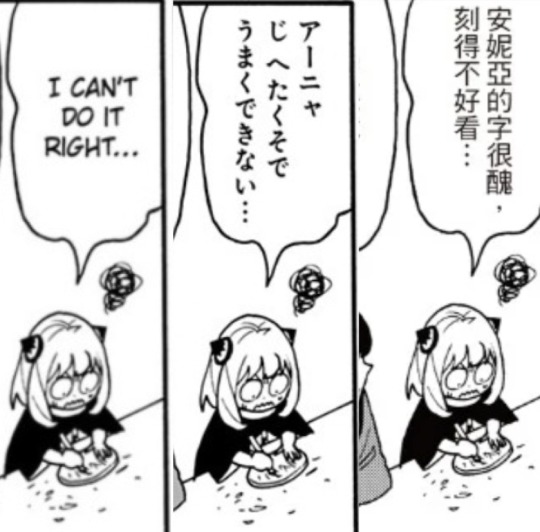
Anyways...
I love translation comparisons mainly because you get to experience cultural exchange if you are fortunate enough to understand or have access to a translator (*cough* @connoisseursdecomfort *cough*) who enjoys comparing multiple languages. Thank you for doing God's work @connoisseursdecomfort <3
#spy x family#spy x family spoiler#spy x family manga spoiler#spy x family chapter 90.1#short mission 11#loid forger#twilight#anya forger#sxf#analysis#linguistics#scarlywroteathing#updated analysis#discourse analysis#loss in translation#cultural discount
46 notes
·
View notes
Text
Book of the Day - A Practical Handbook of Corpus Linguistics
Today’s Book of the Day is A Practical Handbook of Corpus Linguistics, edited by Magali Paquot and Stefan Th. Gries in 2021 and published by Springer.
Magali Paquot is a permanent FNRS research associate at the Centre for English Corpus Linguistics, UCLouvain. She is co‐editor in chief of the International Journal of Learner Corpus Research, a founding member of the Learner Corpus Research…
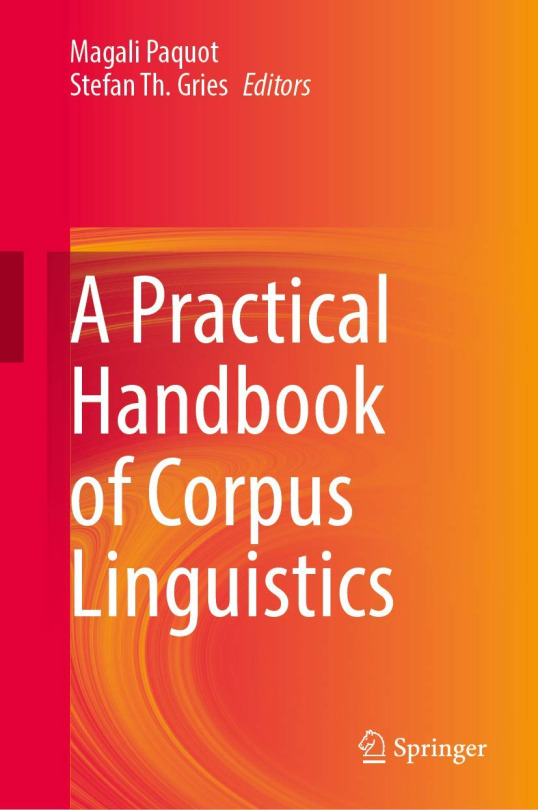
View On WordPress
#A Practical Handbook of Corpus Linguistics#AI#AI developer#Artificial Intelligence#Business#business coach#business consultant#Coaching#consulti#Corpus Linguistics#Discourse Analysis#linguistics#Magali Paquot#quantitative analysis#Raffaello Palandri#Stefan Th. Gries
69 notes
·
View notes
Text
discourse analysis can suck my balls
#discourse analysis is the bane of my existence#i mean i love studying english and i get it’s important but god at what cost#i’m in the trenches#look i enjoy debating semantics just as much as the next person but multiple discourse analysis assignments in a row? are you kidding me?#and they’re for different modules too#english major#discourse analysis
2 notes
·
View notes
Text
Beyond the Discourse
An introduction to discourse analysis:
Since this blog is dedicated to discourse analysis, it is only logical to explain what discourse analysis is before venturing to other subjects. In short, DA studies the ways sentences and utterances (speech) go together to make texts and interactions and how those texts and interactions fit into our social world. It can be defined in three different ways:
- Language beyond the level of a sentence.
- Language behaviors linked to social practices.
- Language as a system of thought.

There are many dimensions to analyzing any kind of discourse, no matter the length. Even something as short as the word ‘no’ can carry implications that go beyond its meaning on the surface level, only those who are socially savvy can pick up on it— and discourse analysts, of course. Which is what sparked my fascination with the field, resulting in the birth of this blog! That, and the fact that this blog is part of my assessment for the discourse analysis course that I am currently taking.
Why the name “beyond the discourse?”
I felt like it was a fitting name, since the word ‘discourse’ does not simply mean ‘conversation’ alone, it goes beyond that. It includes things like social contexts, the person who is using the language and under what conditions it is being used, the receiver and many more aspects. I also chose it as part of a chain my friends and I decided to do as one named her blog “Beyond the Word” and the other named it “Beyond the Sentence”.
I will be sharing my analysis of discourse that either occurred in my day to day life or appears in things I find interesting. So basically, discourse analysis with my personality sprinkled on top.
7 notes
·
View notes
Text
Qcard Thoughts!
Episode: Qpid
(Picard bursts into the room dressed as Robin Hood.)
Vash: "You're Robin Hood!"
Picard: "My staff and I were brought here by an old adversary of mine named Q!"
😁 Oh, Picard! How he boldly claims Q as HIS adversary! True in this episode Q is laying on the romance really thick with no one else but Picard, of course. But even though Q seizes plenty of opportunities to charm and flirt with him in Encounter at Farpoint, Hide n'Q, QWho, and Deja Q, our favorite omnipotent and gay entity interacts with and poses some kind of threat/menace to everyone in the Bridge crew, not just Picard. It's a safe bet that Riker, Beverly, Troi, and the others see Q as an adversary. Ahem, Borg encounter, anyone?
Now, Picard could've said to Vash: "My staff and I were abducted and brought here by an old adversary of OURS, (or just ...an old adversary named Q.")
I've always thought it was a bit much, albeit for a fleeting moment, that Picard claimed Q as "an old adversary of mine."
That sort of made it seem like Q had focused all of his previous torments on him in the past. It also had a bit of a possessive vibe to it, quite frankly.
I have no doubt that Q would just love that one! He lives for being in that special place in his capitaine's heart! Oui! Oui!

#qcard#star trek q#eternal love#q is special to Picard#qpid#star trek tng#discourse analysis#john de lancie#patrick stewart
30 notes
·
View notes
Text
Linguistics Jobs: Interview with a Director of Conversation Design
This month’s interview is with Greg Bennett, a Director of Conversation Design at Salesforce, a customizable, cloud software platform for customer relationship management. In this interview, Greg discusses the culture shock from transitioning to industry from academia, and how his discourse analysis training has impacted his work and career in the tech industry. You can find Greg on Twitter @gabennett45 or on LinkedIn.
This last post of 2022 is also the last in this series, and we'll have more in 2023 about the future of lingjobs!

What did you study at university?
I hold a BA in Linguistics and MS in Applied Linguistics from Georgetown University. I also studied Japanese language and culture during undergrad. My academic focus was on interactional sociolinguistics—particularly, how users manipulate textual stylistics to convey contextualization cues during synchronous, text-based chat.
What is your job?
I founded and lead the Conversation Design team and practice at Salesforce. I oversee strategy and workflow for an international team of Conversation Designers who craft conversational experiences that “sound” like Salesforce and train language models to recognize myriad varieties of language input from users. I spend much of my time discussing with various leaders across the business the resource investment strategy for conversational apps and features that position Salesforce at the forefront of the market; scaling our resources and tools to expand my team’s sphere of influence across our ever-growing lines of business; and championing my team’s impact on our bottom line within and beyond the company.
How does your linguistics training help you in your job?
I never expected linguistics to be as vital or central to my role as it is now. I’ve always had my discourse analytic mindset running in the back of my mind to interpret conversation and stancetaking in real time in all of my past roles. As a leader at Salesforce, I certainly maintain that approach to developing relationships with stakeholders across the business. However, since conversational AI is fundamentally about language as an interface for a technological system, I find myself referencing every aspect of my training as a linguist to contextualize and strengthen my proposals for a conversational solution—from generative syntax when debating the ‘conversationality' of a conversational app’s brand name, to acoustic phonetics when determining the pitch range for a voice app in 2019, to discourse markers when creating cohesion between turns of text-based chat with our chatbot templates—I basically spend all day, every day, using linguistics to form connections and drive product strategy.
What was the transition from university to work like for you?
It was a huge culture shock! My first role outside academia was as a UX researcher at Microsoft. I was coming off the heels of having a limit on the amount of photocopies I could make in the Department of Linguistics to entering an office where food was catered every day, Post-Its could be used ad nauseam with nary a pang of guilt, and every time I had a research finding to articulate, it had to be done in a slide as opposed to a fleshed-out paper (to say nothing of my joy at being able to photocopy in color at the office). Everything required fewer words, had to be finished in a fraction of the time, and had to look way more visually appealing than anything I was ever expected to do in academia. I had to go beyond simply stating, “this is what I found in the data” and evolve towards, “we as a business should do y in order to make a market impact of z because the data say x.” (In industry, always lead with the “so what” and follow up with the data—something I learned from profoundly expert and gracious women in UX who taught me how to adjust to corporate priorities, read the atmosphere of a business, and succeed at advocating for oneself and one’s craft at the highest levels. I wouldn’t be where I am now without them.)
Do you have any advice do you wish someone had given to you about linguistics/careers/university?
My advice would be that your title and your degree aren’t the defining characteristics of who you are and what you do. When I was in academia, I deeply enmeshed my sense of self and self-worth in my status as a graduate student, and when I took a break after the MS, I had to mourn the death of a huge part of my identity. I had no idea who I was without the Department of Linguistics at Georgetown. But, after a lot of therapy and soul-searching, I came to the realization that even if I didn’t have the title of “student” anymore, that didn’t mean I was no longer capable of learning, just like even if I no longer had the title of “Director of Conversation Design,” it wouldn’t mean that I would suddenly become incapable of leading product strategy for conversational AI. Look inward. Titles, accolades, insignia—they’re distractions. Figure out what truly motivates you, what fulfills you and align to the elements of those qualities that present themselves in whatever role you pursue.
Any other thoughts or comments?
A quick overview of the company I work for and the evolution of its conversational technology: Salesforce is a publicly traded company that provides customer relationship management software as a service in the cloud. In 2017, the company released the Einstein Bot Builder, a declarative platform for Salesforce administrators to create and deploy text-based chatbots to their own customers for service use cases. Since then, it’s grown into an expansive feature ecosystem, ranging from chat analytics to reusable chatbot templates. The Bot Builder, coupled with Slack, which Salesforce acquired in 2020, opened up the opportunity for me to establish a design practice by which Salesforce can create unified, consistent, and inclusive conversational chat experiences based on sociolinguistic research.
Recent interviews:
Interview with a Research Scientist
Interview with a Language Engineer
Interview with a Natural Language Annotation Lead
Interview with an Artist
Resources:
The full Linguist Jobs Interview List
The Linguist Jobs tag for the most recent interviews
The Linguistics Jobs slide deck (overview, resources and activities)
The Linguistics Jobs Interview series is edited by Martha Tsutsui Billins. Martha is a linguist whose research focuses on the Ryukyuan language Amami Oshima, specifically honourifics and politeness strategies in the context of language endangerment. Martha runs Field Notes, a podcast about linguistic fieldwork.
#linguistics#linguistics jobs#ling jobs#lingjobs#tech industry#discourse analysis#linguist#conversation design
12 notes
·
View notes
Text
Okay I fixed my other problem with Elan but this programme is on thin fucken ice
Anyway it’s actually hilarious to do discourse analysis on Sid’s interview register/speech style according to speech act theory since his utterances are a wonderful example of non-performative acts because they add net zero information (he literally repeated the interviewer’s own words in an earlier utterance and he does it with such monotonous flair that nobody notices, like he says so much without saying anything at all and I love him about it your honour)
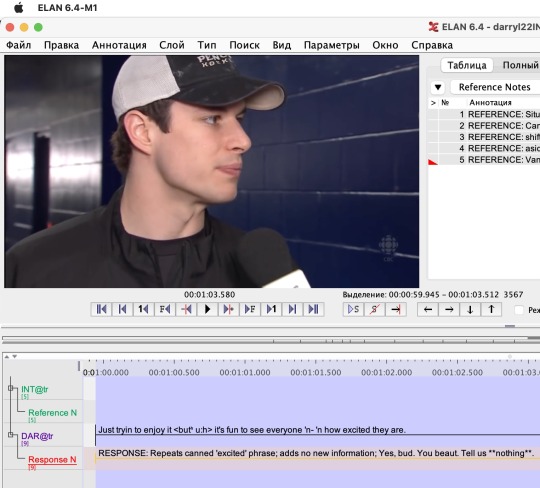
#thank you Sidney Crosby for tethering me to my sanity#anyway I still don't like Elan#It will be easier when I'm using my own recordings because then I will have control over the formatting BUT UNTIL THAT DAY#this programme will be a thorn in my side#discourse analysis#linguistics#grad school shenanigans
5 notes
·
View notes
Text
Analyzing Signs
The text has been analyzed based on the three approaches.
The text is divided into four sections with a sign that clarifies the text. The clauses are written clearly with a reason given to demonstrate the aim which is a warning.
The first section is the title ⚠️ CAUTION ⚠️ is written in bold on a yellow background to attract the readers, with capitalization letters and between two symbols ( a black exclamation mark within a yellow triangle) to warn of potential danger.
The second section is written in bold and red to emphasize the danger and tells the reader that the surface is hot.
The third section is also written in bold but in a smaller font size to tell the reader the consequence of touching the hot surface.
The fourth section is written in bold as well with a bigger font size that asks the reader to not touch.
The second section tells why while the fourth section is an order. As the third section clarifies the consequence/ reason.
No punctuation marks were used.
The language used to state passersby or visitors as in a public place.
The language is tended to be formal and written by an employer to be directed to the general public.

2 notes
·
View notes
Text
i have to attend discourse analysis class and after all the fights i've had here and on twitter i feel like i'm gonna ace the exam 💀
4 notes
·
View notes
Text
What things give you energy?
Daily writing promptWhat things give you energy?View all responses
What things give you energy?
We live in a large house, almost a barn really. Some of our friends call it our hacienda. They are the ones who speak no Spanish and can’t pronounce Quevedo correctly, even though I’ve known them for a quarter of a century. Actually, strictly speaking, most of them are ex-friends now. Many went AWOL…

View On WordPress
0 notes
Text
subject: vivien burr
Greetings,
Within film and media, discourse analysis is a method that is used to examine language within a given social context. Since it is a film and media class, my lecturer has extended that concept further into a multimedia context where the examination of social interaction extends to the visual medium.
Discourse is socially constructed, according to Vivien Burr, as it pertains to a particular situation within a particular point of time.
While she is not a progenitor of discourse analysis, in her book "An Introduction to Social Constructionism" she writes on the social constructionist movement within social psychology; despite this much of her writings pertain to the perception of the world, and therefore, can be adapted unto media studies as media representations of our world act as a manifestations of our perceptions through the creation of something that is inspired and based on something "real."
She decribes that while not all writers of social constructionism have all of the same tenants, they have similarities which bring them under the same umbrella. One of the main points being a critical stance towards taken-for-granted knowledge.
to quote from the book: "[social constructionism] invites us to be critical of the idea that our observations of the world unproblematically yield its nature to us, to challenge the view that conventional knowledge is based upon objective, unbiased observation of the world."
Throgh social constructionism, it brings the individual to question why distinctions in the world are made and given importance; thereby challenging empirical views of the world.
Be well,
Ann A.
0 notes
Text
Discourse analysis 3
Saying things never goes without doing things and being things. To understand anything fully you need to know Who is saying it and What the person is trying to do.
That is who the person is and what they are trying to do.
Identity=different ways of being in the world at different times and places for different purposes.
Saying follows from doing and being
While games have rules which determine winners and loser
Practices have “conventions” (I.e rules) to determine who is “appropriately /normal acting and who is not.” (A type of winning and losing)
These practices are ways of saying doing and being
Social goods=anything some people in a society want and value.
All forms of language get their meaning from the games or practices they are used to enact .
In using language social goods are always at stake. That is we can speak or write so as to accept others as “winners” or “losers” in the game or practice in which we are engaged.
1 note
·
View note
Text
خطاب السّياسة الخارجيّة الأمريكيّة في سياق صفقة القرن
خطاب السّياسة الخارجيّة الأمريكيّة في سياق صفقة القرن
خطاب السّياسة الخارجيّة الأمريكيّة في سياق صفقة القرن
الكاتب : أبو حمَّاد إبراهيم
الملخَّص:
تناقش هذه الدراسة الموسومة ب ” خطاب السّياسة الخارجيّة الأمريكيّة تجاه الحقوق الفلسطينية في سياق صفقة القرن” في مبحثين: تناول المبحث الأول خطاب السياسة الخارجية الأمريكية تجاه الثوابت الفلسطينية في سياق صفقة القرن، ويفحص المبحث الثاني خطاب التفاعلات…
#American foreign policy#Discourse analysis#the deal of the century.#the Palestinian rights. ; تحليل الخطاب#الحقوق الفلسطينية.#السياسة الخارجية الأمريكية.#صفقة القرن.
0 notes
Text
خطاب السّياسة الخارجيّة الأمريكيّة في سياق صفقة القرن
خطاب السّياسة الخارجيّة الأمريكيّة في سياق صفقة القرن
خطاب السّياسة الخارجيّة الأمريكيّة في سياق صفقة القرن
الكاتب : أبو حمَّاد إبراهيم
الملخَّص:
تناقش هذه الدراسة الموسومة ب ” خطاب السّياسة الخارجيّة الأمريكيّة تجاه الحقوق الفلسطينية في سياق صفقة القرن” في مبحثين: تناول المبحث الأول خطاب السياسة الخارجية الأمريكية تجاه الثوابت الفلسطينية في سياق صفقة القرن، ويفحص المبحث الثاني خطاب التفاعلات…
#American foreign policy#Discourse analysis#the deal of the century.#the Palestinian rights. ; تحليل الخطاب#الحقوق الفلسطينية.#السياسة الخارجية الأمريكية.#صفقة القرن.
0 notes
Text
Scholarship can make a significant contribution to enlightenment, yet ‘scholarship’ needs to take a stance and express itself in comprehensible ways, in many different public spheres and via different genres of text and talk.
Ruth Wodak (Interviewed by Andreas Schulz)
#academia#scholarship#discourse#discourse analysis#critical discourse analysis#sociolinguistics#academics#critical linguistics#dark academia
0 notes
